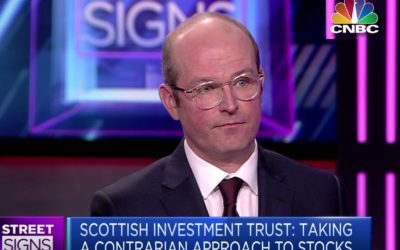06/12/201915 mins
[Video] Four key questions for investors in #Contrarian2020
As contrarians, we’re always watching for signs that the market’s tides might be about to turn. Our core conviction is that everything is cyclical – including out-of-favour stocks. So, could 2020 be the ‘Year of the Ugly Duckling’?
1. Will investors see the value in value?
For years now, the market has been all about growth – tech stocks in particular. But this September, we saw a sudden, if short-lived, reversal. That took many investors by surprise, showing just how quickly market momentum can shift.
That would have important implications as markets are, to a large extent, driven by algorithmic trading rather than by human decision makers. That means that when the pendulum eventually starts to swing back, the dislocation could be dramatic.
If this were to happen, technology companies that have been the strongest in the recent past could be first in the firing line. The obvious beneficiaries would be value stocks – which have lagged. Most of them trade on lower multiples, and often have higher dividend yields.
Alasdair McKinnon discusses in the video:
2. Is the disruption bubble about to burst?
A sudden sell-off in growth in September might suggest that at some point investors may start to question the worth of these companies. Can the underlying businesses continue to grow sustainably? The mantra of the growth mania has been disruption, but we’re now seeing signs of the disrupters being disrupted.
Take WeWork, for example. Posing as a tech firm, this office rental company threatened to disrupt the property market. Although the founder has walked away with billions, the company continues to burn cash for no tangible reward, and its backers have pulled the plug on its IPO due to lack of investor interest. Could WeWork be the canary in the tech mine? Many investors seem to have forgotten the year 2000 – that was marked by the peak of the dotcom bubble.
Alasdair McKinnon discusses in the video:
3. What does more cheap money mean?
We’re now more than 10 years on from the start of the quantitative easing experiment. So how has it gone? Financial markets have risen on a tide of cheap money, but has QE stored up problems for the future? Prolonged monetary easing has led to huge levels of debt and yet politicians, whether populist or not, are now likely to embark on a fiscal spending spree to try to boost flagging economic growth.
With renewed quantitative easing looming, and low or negative interest rates looking like they are here to stay, should we be looking more closely at gold? After all, gold is a more enduring store of value – as governments can’t simply print more gold.
Alasdair McKinnon discusses in the video:
4. What’s happening in the wider world?
With the UK election looming in December, the result could prove decisive for the Brexit process – one way or the other. More certainty on that outcome could lead to a reappraisal of domestically focused UK stocks. Long out of favour, these shares have ample room to rebound. However, if recent elections have tought us anything, it’s to expect the unexpected.
What about the trade war? The USA’s relationship with China is crucial for the health of the global economy. A sustained breach of normal relations would further dampen global growth – and both sides will want to avoid this.
Finally, we’ve got the US presidential election next November, with primaries and an impeachment process beforehand. Can Mr Trump be beaten? These are just a few of many pressing questions to be answered next year.
Alasdair McKinnon discusses in the video:
Please remember that past performance may not be repeated and is not a guide for future performance. The value of shares and the income from them can go down as well as up as a result of market and currency fluctuations. You may not get back the amount you invest.
Please note that SIT Savings Ltd is not authorised to provide advice to individual investors and nothing in this blog should be considered to be or relied upon as constituting investment advice. If you are unsure about the suitability of an investment, you should contact your financial advisor.



